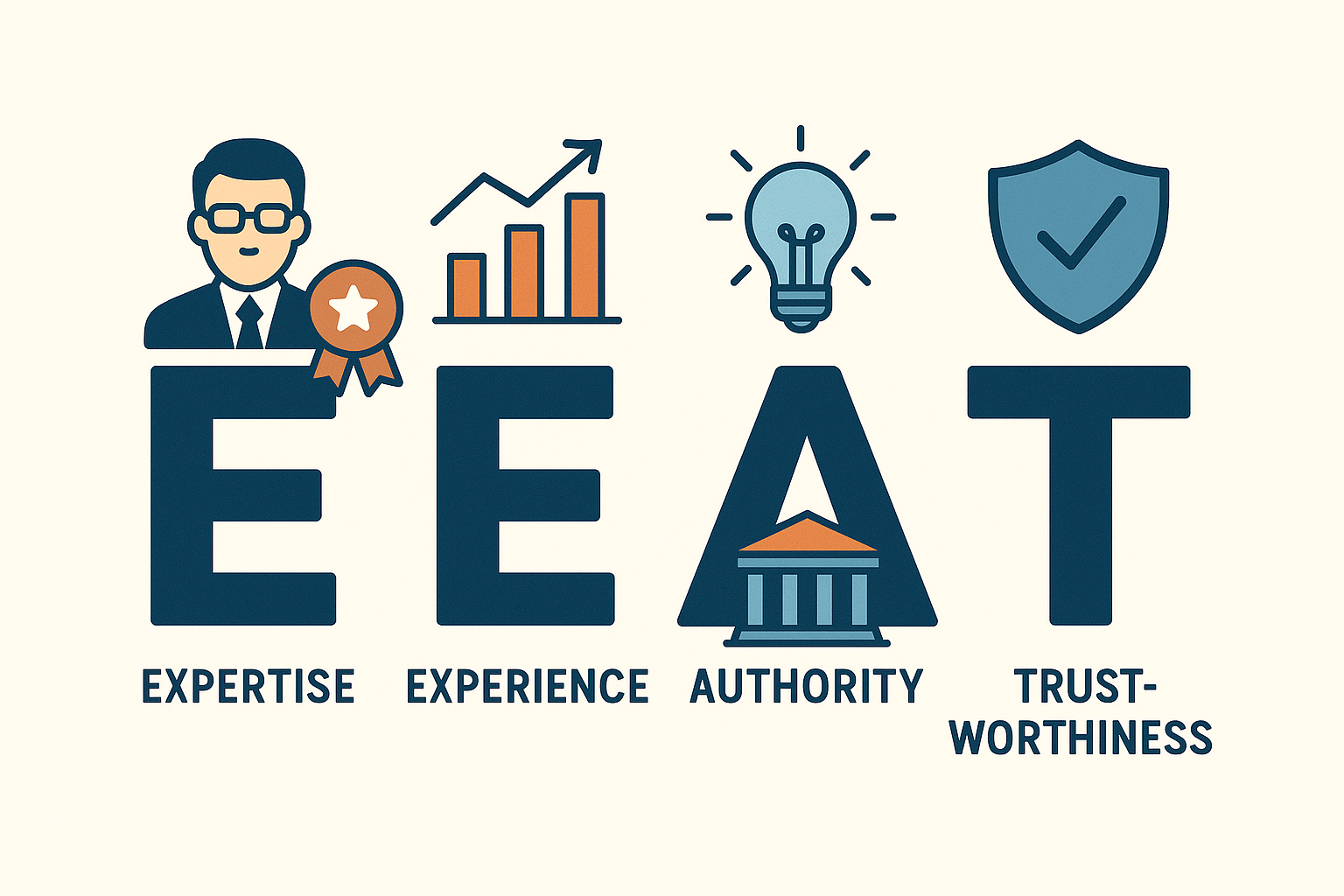Google EEAT Explained: How to Boost Rankings with Expertise & Trust (2025 Guide)

Hey guys!
So, this is my very first blog post here—and I’m kinda excited to share what I’ve been learning in the world of SEO. Honestly, I just started digging into this topic and guess what? I stumbled upon something called E-E-A-T. Yeah, it sounds a bit weird at first (like a food blog?), but it actually stands for:
Experience, Expertise, Authoritativeness, and Trustworthiness
Cool, right?
I was super curious about what all this means. So I did what everyone does—I googled it. Then I went one step moved and asked DeepSeek. It gave me a simple explanation
Visual guide to Google’s EEAT (E-A-T) quality guidelines for content creators.
Oh, and here’s something important:
The E-E-A-T concept was officially updated in 2022 by Google’s Search Quality Evaluator Guidelines. So, it’s not just some random trend—it’s part of how Google actually evaluates content for quality and trust.
But wait… that’s not all.
While I was exploring E-E-A-T, another strange term popped up—YMYL. I was like, “Okay, now what is this?” So I asked DeepSeek again. And here’s what I found it stands for Your Money or Your Life. Sounds intense, right? Again I searched

Visual explanation of “Your Money or Your Life” content requirements.
Basically, it refers to topics that can affect people’s health, money, safety, or happiness. Like stuff where wrong info can seriously mess things up.
For example:
Searching about “how to treat diabetes” or “COVID vaccine side effects”? Yeah, Google wants that info to come from actual doctors or medical researchers—not just random bloggers.
If you’re googling “best retirement plans” or “how to file taxes,” the info should ideally come from a certified financial expert or a CA.
Legal advice? Health info? News about elections or natural disasters? These aren’t things Google takes lightly. They want trustworthy people behind that content.
And here’s something else I noticed while browsing…
“Understanding the ‘why’ behind E-E-A-T is crucial. The ‘how’—actually weaving these principles into your content, site structure, and link profile—is where most sites struggle. ‘Beyond Keywords’ provides the actionable framework for building the topical authority and trust signals that Google rewards. Stop learning about E-E-A-T and start implementing it. Get the guide.
Not All Google Searches Are the Same
This might sound obvious, but stay with me. To find that I started typing random things into Google just to see what comes up. And guess what? The kind of result you get actually depends on what you’re really looking for—even if you don’t realize it.
Like one time I searched “How to fix a leaky faucet”—I got a blog post with step-by-step instructions
Screenshot of a Google featured snippet displaying step-by-step instructions to fix a leaky faucet.
Basically, Google knew I wanted to learn how to do something for my own.
Then I searched “Who invented the telephone?” and boom—straight answer “Alexander Graham Bell”
Historical evidence from Wikipedia and .gov sources.
No fluff, just a fact.
I also tried typing “Symptoms of vitamin D deficiency”, and the result was a health snippet right at the bottom. Super helpful and AI-generated too
Screenshot of Google results highlighting vitamin D deficiency symptoms with expert insights.
So yeah, when you’re looking to learn or understand something, Google gives you Informational content—like blogs, Wikipedia pages, and videos also.
But then I tried something different.
I typed in “LinkedIn login” and “Spotify Web Player”—and Google directly showed me the official sites. No explanation, just “Here’s the site, go there.”
Screenshot of LinkedIn’s login interface with career development features.
Screenshot of music streaming search results with popular tracks.
That’s called Navigational Intent—you already know where you want to go, and Google just points you to it.
In a few weeks ago , I decided to purchase Laptop
So I searched “Best performance laptop under 60k”
Price comparison of budget laptops with specs and ratings.
and got sponsored content, blogs listing top picks, YouTube videos reviewing models also
Then I got curious and typed in stuff like “iPhone 15 vs Samsung S23 features” and “Is Star Health Insurance worth it?”
You know what happened?
Side-by-side comparison of flagship phone features.
Insurance premium rates and customer experience reports.
Google gave me comparison articles, opinion blogs, and even Quora threads. Basically, I was in Research mode—This is called Commercial Intent (User want to research).
Finally, when I really made up my mind and searched “Lenovo loq buy” Google didn’t waste time. It showed me direct links to purchase pages, checkout buttons, and ads and near me locations.
Shopping results showing specs, prices and cashback offers.
Hotel search results showing deals and guest reviews.
That’s when I learned this is Transactional Intent because I’m ready to buy.
So yeah !!! I learned a lot through this whole googling process.
It really taught me how Google search works, and how important Content quality and Search Intent are when it comes to SEO.
If you found this fun or learned something new, I’d love it if you could subscribe or leave a comment. More cool stuff coming soon as I learn along the way!
You now understand that E-E-A-T isn’t a checklist; it’s the foundation of modern SEO. ‘Beyond Keywords’ provides the complete system for building that foundation—from content strategy and site architecture to earning authoritative links—ensuring your site is built to rank and withstand algorithm updates. Future-proof your SEO. Get the book.
Thanks for reading












